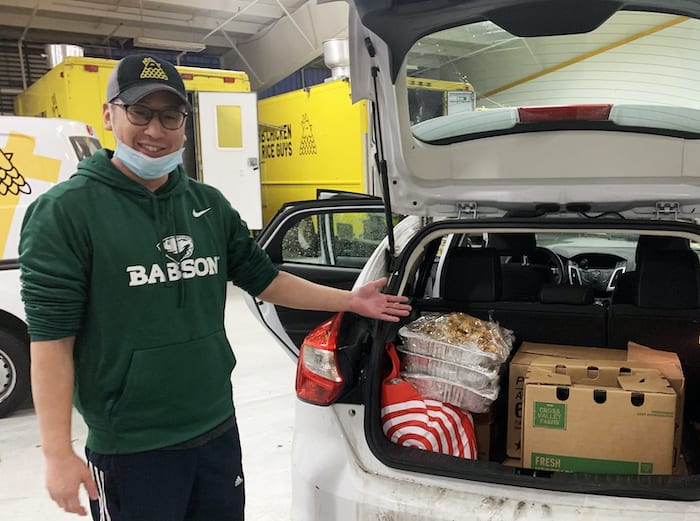
“Our volunteers are heroes. They have been incredibly responsive during this crisis. They’ve also been patient, kind, and working as a team with (at-first) perfect strangers, who all share the same goal: to do good.”
Operating throughout Massachusetts and especially in Greater Boston, Rescuing Leftover Cuisine provides an essential service at all times, not just during worldwide pandemics. Relying on a robust network of volunteers and kitchens across the region, RLCMA is a “platform for volunteers to recover excess food from businesses and transport it to local human service agencies.”
As you might imagine, vols and organizers with the nonprofit are working tirelessly these days, and are “committed to transporting healthy food to partners who are serving their communities during the COVID-19 crisis.” Specifically, RLCMA is providing “one-time emergency food rescues” free of charge in order to help local food service providers—restaurants, hotels, institutions—offload and get it to people who need food.”
Since readers have been asking for advice about how they can get involved with this kind of coordinated effort, we threw a couple of questions at Dana Siles, the New England coordinator RLCMA, about their volunteer network and more. Their primary goals at this difficult time: to recruit more helpers, and “to let food service providers know that we are assisting them to offload food to donate to those in need.”
What’s the biggest change in how Rescuing Leftover Cuisine operates?
Our standard platform is for RLC rescuers to transport excess food from companies hosting professionally catered lunches and from commercial kitchens at schools, hotels, and restaurants. Nearly 80 events per week are listed on our calendar, where volunteers sign up either on a recurring basis or sporadically (most events are regularly scheduled and some are ad hoc).
The recipients (human service agencies) are predetermined and so our rescuer is provided specific event instructions upon signup. An average event rescues about 40 pounds of food, which would feed 32 people (1.25 pounds of food being the equivalent of one meal).
During the coronavirus pandemic, we are averaging 15 weekly rescue events, about 50% recurring and 50% spur-of-the-moment emergency ad hoc events. On average, we are now transporting about 500 pounds of food, which feeds about 400 people. Our operation has changed significantly in a few ways:
- Currently we are only rescuing food from providers who remain open and experience excess food at the end of the day, such as Dig Inn, Boston Harbor Hotel, Mandarin Oriental, and Eataly; or who are temporarily closing and have food to offload before doing so, including recent partners like Pret A Manger, Hampshire House, Bon Me, The Chicken & Rice Guys, and The Lantana.
- RLCMA typically relies on our dedicated food donor partners to fund the cost of our 501(c)3 organization through fee-for-service. We are providing emergency food rescues free of charge until further notice in order to help local service providers offload their excess food and get it to people who need food.
- Most Rescue Events only required one individual to volunteer. We are now often collaborating with two to six rescuers for events in order to evenly distribute the food to our recipients.
- All event recipients are normally pre-determined based on schedule, geography, and what the service agency needs in relation to what the donor provides. Currently, I’m custom-routing each event as it comes up, based on what the service agencies need that day (quantity and other special needs are changing by the day).
- We are currently collaborating with a few city and private agencies to distribute food to qualifying individuals as well, and I will have more to share about this over the upcoming weeks.
What’s the biggest difference you see in the food need and supply situation now from, say, three weeks ago?
Up until the last month, we were serving over 70 human service agencies throughout Massachusetts. Our volunteer rescuers transported excess fresh and prepared food on a recurring daily or weekly basis to about 25 of these agencies and on an ad hoc basis to the remainder, whenever we had a good fit for them.
Given the steady stream of food deliveries from organizations like ours, Food For Free, Lovin’ Spoonfuls, Boston Area Gleaners, Community Servings, etc., these service agencies were able to plan their budget and menus accordingly. Many HSAs relied (and still rely) on a combination of our organizations based on their perishable/non-perishable storage capacity, population, schedule, location, etc. That said, we (local food recovery organizations) complement each other by tackling hunger and food insecurity and eliminating wasted food from different vantage points, which has always been important and is now more than ever.
Many human service agencies are temporarily closed or not accepting prepared food donations at this time. RLCMA is still serving about 25—most already partnered with, with the addition of some new agencies. Our existing recipient partners continue to serve those suffering from homelessness and food insecurity—many of whom live on the streets and walk to get food, or reside in local shelters with kitchens. Our new partners also serve this population. In addition, they are distributing food throughout their communities during this pandemic, either bringing to drop off points or to individual homes. Food insecurity has clearly risen due to the spike of unemployment, so more people are in great need of healthy food.

There are other organizations similar to yours across the country, that provide similar services. Are you in touch with and/or monitoring any of them during this time? Anything of particular note that you are seeing and hearing in other cities?
Yes indeed. Geography and accessibility strongly affects how food recovery organizations are tailoring our operations to serve our communities during this time. I am in touch with many organizations throughout Massachusetts and we are all supporting each other and working together to serve the community. When I get a request for an extremely large food donation, I alternate between referring Lovin’ Spoonfuls and Food For Free, because they have trucks and can handle large quantities. That said, last week Trader Joe’s in Allston needed 1,100 pounds of food offloaded, so Lovin’ Spoonfuls asked if our recipients could use that food and we immediately recruited six volunteer rescuers to strategically transport it. It’s a team effort.
What are some items that people are especially in need of?
It really depends on the service agency. Some need ingredients for their kitchens to cook for 10-200 people per day. And the amount of food they need and can handle is determined on their capacity, how many meals they are preparing each day, etc. Some service agencies only need or will accept pre-packaged foods because they are distributing it to those who are elderly, at risk, or quarantined. Collectively, they all need fresh, wholesome food. It’s important to also factor in quality of food. Many who are food-insecure rely on non-perishable foods which are less expensive, last longer, and are more filling. Unfortunately, they often have less nutrients and are higher in calories and fat, so many who suffer from food insecurity also suffer from obesity and/or other health issues. RLCMA’s primary focus is to provide nutritious, wholesome food.
We have seen a lot of centralization efforts by the city and state, which is understandable, like with the collection and distribution of protective gear to those who need it most. Are you working wholly independently? Or are some of the services you provide being routed through other channels due to the situation?
We are working independently and have created eligibility, safety, and sanitization guidelines for our volunteer rescuers, for our donors, and for our recipients. The safety of the food and of our volunteers has always been, and will always be, priority number one. It’s very important that these guidelines are followed for the greater good and everyone collaborating understands this and is working together as a team to make it happen—safely and strategically.
What’s the biggest challenge for Rescuing Leftover Cuisine at this time?
RLCMA is currently providing services free of charge during the C19 pandemic, and so our immediate challenge is that we require funding to offset lost income so we can continue assisting local businesses and provide food for those in need. As I mentioned, we typically rely on a fee-for-service in lieu of outside funding or grants to keep our organization afloat. Due to overwhelming temporary closures of our partners, this income has discontinued. Simultaneously, we’ve had a high demand to rescue food from food service providers and a high demand from service agencies to transport this food. Please consider donating to RLCMA.
What are the biggest needs that your organization has? And how can people help?
There are several ways you can support Rescuing Leftover Cuisine Massachusetts:
- If you are able, volunteer to transport food (click here).
- Educate eligible food donor partners, recipient organizations, and rescue volunteers: We have templates you can use to help us with outreach (email dana@rescuingleftovercuisine.org and put “OUTREACH VOLUNTEER” in the subject line).
- Spread the word. If you have a blog, have access to local media outlets, or know someone who does, let’s collaborate (email: dana@rescuingleftovercuisine.org).
- Share our social media pages and ask your friends and followers to do the same (FB: @RLCMA; IG: @RLC_MA; LI: @RLCMA).
- Donate to RLCMA so we may continue transporting healthy food during this time of crisis.
What are you asking of volunteers? There are specific requirements but generally speaking, what’s the drill and what makes a person a good fit?
RLC is entirely made up of volunteers, who donate 30 minutes or more by picking up and delivering food donations. Anyone can volunteer, via four wheels or two feet. For kind kids under 16, an adult must be present, making this a gratifying family effort. Right now, we’re only asking for volunteers to rescue food if they are under 60 years of age and experiencing excellent health per our current guidelines. The majority of rescues require a vehicle (any size) during this time but volunteers can check the calendar for updates. Outreach work is also invaluable at this time.
Our volunteers are heroes. They have been incredibly responsive during this crisis. They’ve also been patient, kind, and working as a team with (at-first) perfect strangers, who all share the same goal: to do good.
On a personal note, it’s been a humbling experience witnessing the collaborative dedication between our volunteer rescuers, our food donor partners, and our recipients. Over the last few weeks, I’ve only seen the very best in people and it’s honestly been mind-blowing and reassuring. This is truly a team effort and I’m grateful to be a part of it.
Businesses: Can you donate food?
Volunteers: Are you able to transport food?
Human Services Agencies: Do you need food?
Visit: rescuingleftovercuisine.
This article is syndicated by the Boston Institute for Nonprofit Journalism’s Pandemic Democracy Project. Contact pdp@binjonline.org for more information.
HELP DIGBOSTON WEATHER THIS STORM AND CONTINUE PROVIDING ARTICLES LIKE THIS ONE
Dig Staff means this article was a collaborative effort. Teamwork, as we like to call it.

